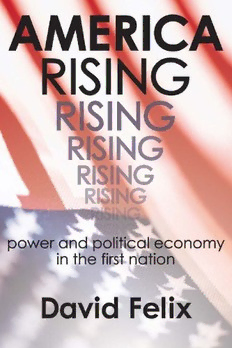
America Rising: Power and Political Economy in the First Nation PDF
Preview America Rising: Power and Political Economy in the First Nation
This Page Intentionally Left Blank Preface iii Preface i Copyright © 2009 by Transaction Publishers, New Brunswick, New Jersey. A ll rights reserved under International and Pan-American Copyright Conven- tions. No part of this book may be reproduced or transmitted in any form or by any means, electronic or mechanical, including photocopy, recording, or any information storage and retrieval system, without prior permission in writing from the publisher. All inquiries should be addressed to Transaction Publishers, Rutgers—The State University of New Jersey, 35 Berrue Circle, Piscataway, New Jersey 08854-8042. www.transactionpub.com T his book is printed on acid-free paper that meets the American National Stan- dard for Permanence of Paper for Printed Library Materials. Library of Congress Catalog Number: 2008031104 ISBN: 978-1-4128-1195-8(E-Book) Printed in the United States of America Library of Congress Cataloging-in-Publication Data Felix, David, 1921- America rising : power and political economy in the fi rst nation / David Felix. p. cm. Includes bibliographical references and index. ISBN 978-1-4128-0811-8 1. United States—Economic conditions—1918-1945. 2. United States—Economic conditions—1945- 3. Economic history—1918-1945. 4. Economic history—1945- 5. International economic relations—His- tory—20th century. 6. International economic relations. 7. Great powers. 8. Balance of power. 9. World politics—20th century. 10. World poli- tics—1989- I. Title. HC106.F45 2008 330.973—dc22 2008031104 Preface v For Georgette This Page Intentionally Left Blank Preface vii Contents Dedication v Introduction ix 1. Critical Mass 1 2. Economics Lesson for Economists 29 and Others 3. The Political Economy of World Power 43 4. America at Home 61 5. America Abroad 75 6. New Deal at Home and Abroad 91 7. USSR: Another Political Economy 115 8. Hitler’s Germany as Facilitator 139 9. Reluctant Empire 153 10. Disorder and Early Sorrow: The Sixties 177 11. Third Way 203 12. China Rising 225 Bibliography 235 Index 249 This Page Intentionally Left Blank Introduction America Rising The United States became a great power in the last quarter of the nineteenth century and a superpower during World War II without quite knowing it. Few Americans, even our experts, fully appreciate the fact today. How many persons know that in recent years we have had a quarter of a million troops on 700 bases throughout the world?1 Consider our recent history of military operations in the Caribbean, East Asia, the Far East, Middle East, Southeast Asia, Africa, and the Balkans. At its impe- rial height Great Britain ruled a quarter of the earthly geography, but it never had the power given us by our massive economy as armored by nuclear and other modes of killing capability. If we need a reminder that our own situation is not assured, Paul Kennedy’s Rise and Fall of the Great Powers: Economic Change and Military Confl ict from 1500 to 2000 is eloquent. He begins by noting the superiority of Ming China (1368-1644) with a population of 100-130 million as compared to Europe’s 50-55 million, China’s descent into becoming a nineteenth-century victim of rising nations from the United States to Japan, and then China’s rise,2 thus my chapter 12, “China Ris- ing.” From 1500 we see the rises of France, Great Britain, Habsburg Spain and Austria, and Germany, and their various descents. We remember Edward Gibbon’s Decline and Fall of the Roman Empire. We got here tortuously but expeditiously. Great Britain was the richest income-receiver until 1901. Between 1900 and 1901 the United States began to outstrip her, going from $4,091 to $4,464 in per capita gross domestic product (GDP), while she went down from $4.492 to $4,450 (in 1990 dollars).3 The gap increased considerably through the century. While it is no grounds for self-congratulation, it expresses the real nature of our positive qualities. In 1800 the country had a population of 5.3 million; ix
